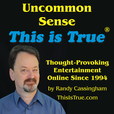
Summary: In This Episode: The question is harder to answer than you …think! But really, what IS thinking? Plus, if you use the “Dunning-Kruger Effect” to judge other peoples’ thinking, you’re doing it wrong — says Dr. Dunning.<br> <br> <a class="twitter-share-button" href="https://twitter.com/share?ref_src=twsrc%5Etfw">Tweet</a><br> <a href="#transcript">Jump to Transcript</a><br> <a href="https://thisistrue.com/category/podcasts/">How to Subscribe and List of All Episodes</a><br> Show Notes<br> <br> * My story on the Dunning-Kreuger Effect is <a href="https://thisistrue.com/incomp/">here</a> (or you can use the easier-to-remember https://thisistrue.com/dke). You can download the original 14-page journal article <a href="http://citeseerx.ist.psu.edu/viewdoc/download?doi=10.1.1.64.2655&rep=rep1&type=pdf">here</a> (PDF, 500K).<br> * In this episode I read some of Wikipedia’s article on <a href="https://en.wikipedia.org/wiki/Thought">what thought “is”</a>.<br> <br> <a name="transcript"></a><br> Transcript<br> Welcome to Uncommon Sense, I’m Randy Cassingham.<br> Even if you believe you already think quite well, you can use what’s in this episode to help teach others how to improve their thinking.<br> Let’s get down to basics, because frankly I’ve seen many people aren’t quite clear on the concept …as perhaps illustrated by the stories in the newsletter every week. To me, though, the most important part of the idea is illustrated by letters I get from readers that start along the lines of, “I’m not a big thinker because I’m not all that intelligent.” And you know what? I hate that self-depreciation, because if that’s what you believe, you’re setting yourself up for failure: you’re setting a belief that you don’t have the capacity to improve — and if you believe that, you’re wrong.<br> Unfortunately I get that from both men and women, but more often women, and it’s my opinion that this message is a societal bug: it’s misinformation, such as the concept that women aren’t good at math and science. So let’s make this clear: you don’t need some sort of abnormally high I.Q. to think, or to improve your ability to think. For instance, my wife and I have a niece who is severely developmentally disabled, and she and her family visited us last week. We’ve seen that her ability to think has significantly improved over the years, and if she can do it, trust me: you can too.<br> Also, we’ve all seen highly intelligent people who do not think very well, at least some of the time. In fact I’m very sure that some of the people I write about in This is True who do really dumb things are absolutely not stupid, but in fact could probably qualify for Mensa, if they’re not already actual members!<br> Yet many people think that if someone is smart, they ought to be able to do anything! They ought to be able to know what to do next, no matter how complex the problem. Just because someone has a high I.Q. doesn’t mean they know everything or can do everything. I’m very good at words; I’m not great at numbers. My math ability is spotty: I’m very good at estimating numbers, but have a such a terrible time getting exact answers I don’t even try to balance my checkbook. I therefore made what I think is a smart decision: that I’d hire someone else to do my bookkeeping since there are people who are as good with numbers as I am with words. They can not only do that sort of work faster than I can, and more accurately, they actually enjoy it! It’s simply a different kind of intelligence.<br> As I’ve said repeatedly in This is True, and in blog posts,
